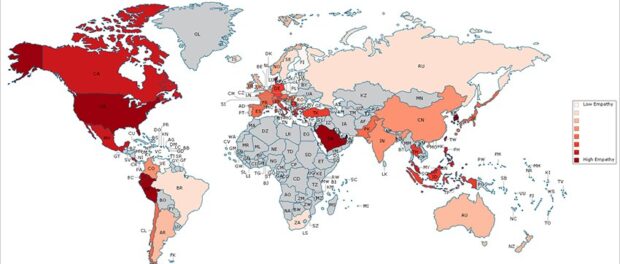
For the original article by Helena Bertho in Portuguese published by AzMina click here.
A study of 63 countries placed Brazil 51st in the ability to put oneself in another’s place.
The study’s results on a map. The darker the color, the more empathy, and the lighter, the less. Countries in gray are those that were not represented in the responses.
Lately, we have been shocked with the behavior of Brazilians in politics and on the Internet. An atmosphere of soccer fanatics, fights and aggression are everywhere. While our rates for rape and femicide continue very high, we are also suffering a large wave of violent comments that blame female victims of violence. At the same time, we have a feminist movement that finds it hard to talk to these victims, and are oftentimes rejected. But why all this violence? A recent study on empathy may point to an answer.
Empathy is the ability to understand emotions and feelings of other people by putting yourself in their place. You are empathetic when you try to understand what the other is going through as a whole, instead of judging the situation from your own viewpoint. And, it seems, Brazilians aren’t very good at this.
According to research from Michigan State University, Brazil is in 51st place–only 12 other countries are doing worse.
But we are so open, such a happy and receptive people, how can we have so much difficulty in understanding the other? “Our society is very hierarchal. A hierarchy based on social class and on origin, on the last name, on social, economic and symbolic capital,” explains anthropologist Hilaine Yaccoube. “There’s a weakness to belonging to a socio-cultural group, which makes the individual want to be very clear on their differentiation.”
For her, facing this scenario, people that recently rose to the middle class feel the need to assert themselves even more as part of the group that is no longer “poor,” that is “upmarket.”
And how do you assert this? You aren’t a criminal, you aren’t common folk, you are a working person who conquered all, that managed to grow via your own merit. And it’s important to really reinforce this in your behavior and speech, in the way you position yourself in the world. Which transforms itself into behavior that is individualistic and which exploits those that are not in the same position as you.
Difficulty to Dialogue
In the same way, Hilaine believes that social movements have placed barriers of exclusion, that they don’t generate a sense of belonging for many people who feel left out and feel the need to reinforce that they are not part of this group. “People were classifying themselves, noticing their differences and binding themselves into resistance groups. Which on the one hand is good, since it created a series of identities of resistance. But on the other, these groups have established a lot of barriers, which exclude, instead of bringing together all people,” she affirms.
In other words, for feminists, for example, perhaps the secret is in understanding the macho discourse in order to dialogue with those that still believe in it, instead of just throwing the person out of the conversation.
Another Brazilian characteristic is a difficulty to dialogue, according to the anthropologist, who has performed empathy and consumer research. “We don’t do well with conflict. Conflict isn’t violence, it’s dialectic, it’s to disagree and argue, to have a collision of ideas. Conflict is healthy and necessary. The problem is that we bring everything to a personal level. With religion, soccer team, or any social phenomenon, we go for personal aggression instead of sustaining an exchange of ideas.”
Ecuador Has More Empathy
The study that looked at empathy around the world was the largest ever of its type and is in accordance with what Hilaine believes: cultural differences from each country influence the empathy of its people. Through an online form, researchers gathered answers from 104,000 people around the world. The countries with insufficient participation were excluded.
The forms asked questions about aspects such as self-esteem, collectivism/individualism and the habit of imagining other’s feelings. And the result showed that countries that have a more collectivist culture, that value interdependence, came out better in the ranking. First place was Ecuador and last, Lithuania.
Despite having some questionable aspects, such as the fact of having been done online and in English, the study brings for the first time a cultural, global look at the subject of empathy.
